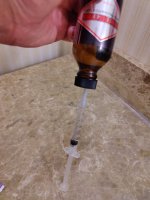Hey guys!
Well, I'm glad to see that the podcasts are bringing attention and some "robust" debate to this interaction with L-Carnitine and Thyroid hormone.
I can't emphasize this enough that it could very well be worth it to get a membership to John Meadows' site (this supports his wife and kids; the month by month membership can be cancelled the next day and still have access the remaining days of the month) to read the two part article there on L-Carnitine.
It seems that BOTH *hypo* and *hyper*thyroidism could lead to reduced L-Carnitine, by impairing endogenous production and increasing excretion, respectively.
Aside from the trickiness that L-Carnitine's impact on thyroid hormone action doesn't appear to show up in bloodwork is that the pharmacology of L-Carnitine loading (and depletion), on an exact time scale, and the dose-response curve of reducing thyroid action aren't well characterized as far as I can tell, so we've got a variety of scenarios where L-Carnitine could either help or hinder fat loss (or apparently do neither for a while... LOL).
-Someone somewhat sub-clinically hypothyroid d/t to a prolonged diet might end up benefiting from topping off L-Carnitine by supplementing at a level that doesn't (immediately) impair thyroid action.
-Someone who's running thyroid hormone (esp T3 I'd suspect) at a supraphysiological level could also benefit from maximizing L-Carnitine Levels as far as fat burning, if (reduced) L-Carn is a metabolic bottleneck.
It might take weeks for thyroid-related L-Carn depletion to occur and loading to occur (especially if orally supplementing), complicating matters, on top of the intricacies mechanism whereby L-Carn is interfering with thyroid action intracellularly (e.g., does this relate more so to blood levels, intracellular free or bound levels, etc.?).
1.) Imagine a person dieting down who initially benefits from L-Carn (optimizing levels) and then ups dose as the diet proceeds, shooting himself in the foot metabolically over the course of weeks as eventually the L-Carnitine starts to put the brakes on metabolic rate. 2.) He / she then adds in T3 (let's say) and remedies that issue and fat loss proceeds. 3.) Then, over time the supraphysiological T3 might end up undoing the elevated muscle levels such fat loss slow, but that 4.) adding more L-Carnitine again seemingly optimizes fat loss. The could be very tricky to figure out amidst ALL THE OTHER factors that are changing (other fat burners, changing in diet, cardio, NEAT etc., etc.)
-Then, as aHarness mentioned, there's the scenario where L-Carn supplementation is putting the brakes on an otherwise hyperthyroid catabolic state allowing a person to gain / hold on to muscle, such that when L-Carnitine is removed (e.g., b/c competitor X gets tired of doing L-carn injections let's say) muscle mass is lost b/c the brake on thyroid action is released and the excess thyroid hormone now is revving protein turnover excessively.
[FYI, there's evidence that L-Carn supplemention (oral) is helpful for a variety of condition where fatigue is prominent (see the moutaindogdiet article for references): chronic fatigue or certain fatiguing pathological conditions, cardiopulmonary disease-associated exercise impairment (e.g., cardiac insufficiency), peripheral artery disease, chronic obstructive pulmonary disease, fatigue in old age (centenarians). Scott McN has mentioned repeatedly on the podcast that it's helps with his symptoms of Long C£¢∞d. So, if someone were to experience less fatigue during a prep, there's a potential effect on NEAT in and of itself for helping with fat loss - simply wanting to be and thus being more active because you feel better - as well as the potential placebo effects that could play a role b/c the person now has a positive association with L-Carnitine.]
-S






















































































